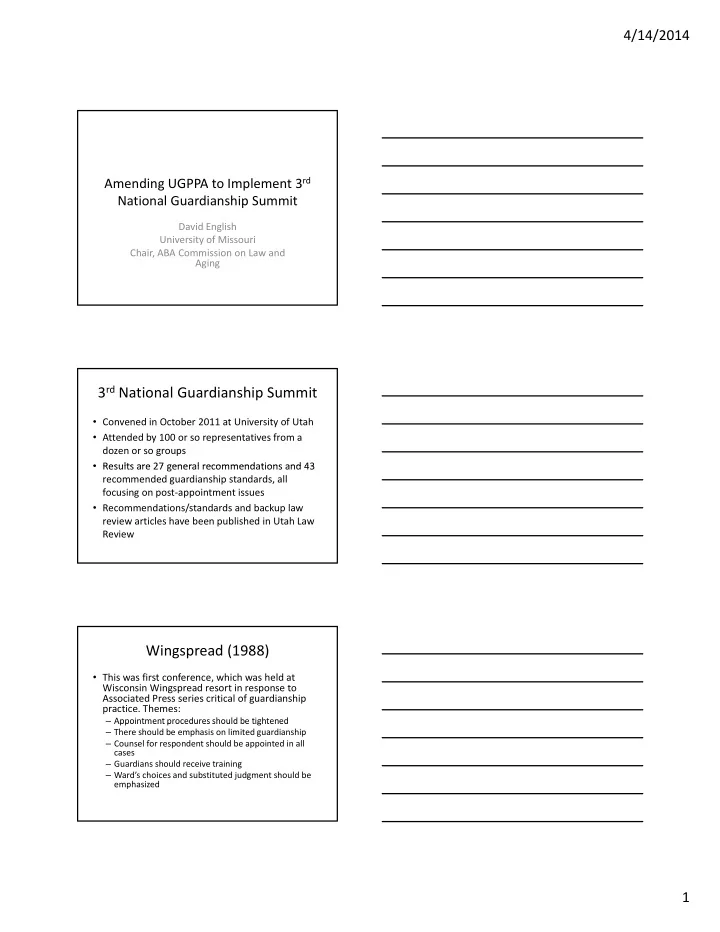

4/14/2014 Amending UGPPA to Implement 3 rd National Guardianship Summit p David English University of Missouri Chair, ABA Commission on Law and Aging 3 rd National Guardianship Summit • Convened in October 2011 at University of Utah • Attended by 100 or so representatives from a dozen or so groups • Results are 27 general recommendations and 43 • Results are 27 general recommendations and 43 recommended guardianship standards, all focusing on post ‐ appointment issues • Recommendations/standards and backup law review articles have been published in Utah Law Review Wingspread (1988) • This was first conference, which was held at Wisconsin Wingspread resort in response to Associated Press series critical of guardianship practice. Themes: – Appointment procedures should be tightened Appointment procedures should be tightened – There should be emphasis on limited guardianship – Counsel for respondent should be appointed in all cases – Guardians should receive training – Ward’s choices and substituted judgment should be emphasized 1
4/14/2014 Wingspan (2001) • This was second conference, which was held at Stetson University College of Law. • Produced series of recommendations largely reinforcing and refining recommendations reinforcing and refining recommendations made at Wingspan. The UGPPA • Stands for Uniform Guardianship and Protective Proceedings Act. • Under Act, a “guardian” is appointed to make personal decisions. A “conservator” is appointed in a “protective proceeding” to make decisions regarding property. • UGPPA originally approved in 1969, but extensive amendment occurred in 1982 and 1997. • Act, even if not enacted by a state in total, has influenced all reform efforts. Implementing 3 rd Summit • Implementation Committee appointed to implement recommendations of 3 rd National Summit. Committee tasked with recommending revisions to UGPPA recommending revisions to UGPPA. • Third Summit also encouraged creation of WINGS [Working Interdisciplinary Network Guardianship Stakeholders] in individual states. 2
4/14/2014 Revising the UGPPA • Implementation Committee divided recommendations/standards into following categories: S ‐ statutory; P ‐ practice standard; E ‐ educational; O ‐ other educational; O other • David English and Linda Whitton of Implementation Committee then revised, reclassifying some S as P or E but also some P or E as S Classification Results • Of 70 recommendations/standards, 33 are classified as partially or fully statutory • The 33 items fall into the following statutory categories: g – Order of appointment – Duties and powers – Reporting – Compensation – Termination Main Themes • Terminology [R1.7] • Transparency of duties [R1.1] • Reporting to court [S1.1, 2.2] • Fees [S 3 1 R3 2] • Fees [S 3.1, R3.2] • Substituted judgment [R1.5] • Financial decisions [S 4.1 ‐ 4.6, 4.8 ‐ 4.9, 4.12] • Health ‐ care decisions [S 5.1 ‐ 5.3] • Residential decision ‐ making [S 6.1, 6.3 ‐ 6.4] 3
4/14/2014 Terminology [R1.7] • “Where possible, the term person under guardianship should replace terms such as incapacitated person, ward, or disabled person ” person. Transparency of duties [R1.1] • State statutes should set forth the mandatory duties of guardians. Court or administrative rules should set forth guardian standards. Reporting to Court • The guardian shall develop and implement a plan setting forth short ‐ term and long ‐ term goals for meeting the needs of the person ‐‐ plan shall emphasize "person ‐ centered philosophy.“ S1.1 • The guardian and conservator shall keep the court informed about the well ‐ being of the person and the status of the estate through personal care and financial plans, inventory and appraisals, and annual reports and accountings. S2.2 4
4/14/2014 Fees • Advance disclosure of fees, including basis, changes, and detailed explanation. S3.1 • Factors in setting fees. R3.2 Substituted Judgment [R1.5] • States should adopt by statute a decision ‐ making standard that provides guidance for using substituted judgment and best interest principles in guardian decisions principles in guardian decisions. • These standards should emphasize self ‐ determination and the preference for substituted judgment. Financial Decisions • Role of substituted judgment in financial decisions. S4.1 ‐ 4.5 • Avoidance of conflicts of interest and self ‐ dealing. S4.6 g • Role of conservation and prudent management in addition to substitute judgment. S4.8 • Bond requirement. S4.9 • Power to delegate. S4.12 5
4/14/2014 Health Care Decision ‐ Making [1] • The guardian, in making health care decisions or seeking court approval for a decision, shall maximize the participation of the person. S5.1 • The guardian shall g – Acquire a clear understanding of the medical facts – Acquire a clear understanding of the health care options and risks and benefits of each – Encourage and support the individual in understanding the facts and directing a decision. S5.2 Health Care Decision ‐ Making [2] • To the extent the person cannot currently direct the decision, the guardian shall act in accordance with the person's prior directions, expressed desires, and opinions about health care; or, if unknown and unascertainable, – Act in accordance with the person's prior general statements, actions, values and preferences; or, if unknown and unascertainable, – Act in accordance with reasonable information received from professionals and persons who demonstrate sufficient interest in the person's welfare, to determine the person's best interests. S5.3 Residential Decision ‐ Making [1] • Protocol for ascertaining person’s goals on residential placement. S6.1 • The guardian shall have a strong priority for home or other community based settings home or other community ‐ based settings, when not inconsistent with the person's goals and preferences. S6.3 6
4/14/2014 Residential Decision ‐ Making [2] • The guardian shall make and implement a person ‐ centered plan that seeks to fulfill the person's goals, needs, and preferences. The plan shall emphasize the person's strengths plan shall emphasize the person s strengths, skills, and abilities to the fullest extent in order to favor the least restrictive setting. S6.4 7
Recommend
More recommend